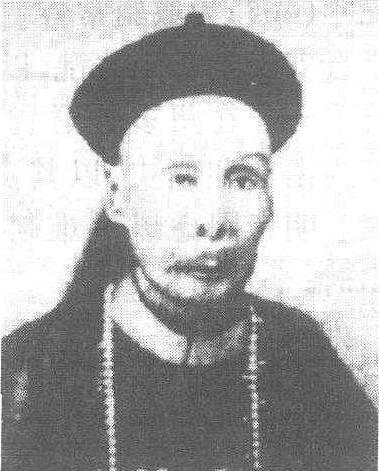During the Qing Dynasty, the Tiandihui, because of its slogans such as "anti-Qing restoration", "for the Sake of Heaven", and "robbing the rich and helping the poor", has become a sworn enemy of the Qing Dynasty since its inception, and has been severely cracked down by the government.
However, in the late Qing Dynasty, there was a member of the Heaven and Earth Society who became an official of the Qing Dynasty and a general soldier of the official Zhizheng Erpin.
This man's name is Liu Yongfu.

Liu Yongfu (Chinese: 刘永福; pinyin: Ríng Ngīng Yīng Đạng Đồng Đạng Đ Liu Yongfu came from a poor fisherman's family, he was able to make his own fishing rod at the age of 5, and at the age of 13 he worked as a sailor on a boat.
In the late Qing Dynasty, the poor were living more and more difficultly. When Liu Yongfu was 17 years old, his father, mother and uncle died of illness one after another, leaving him alone in the world. In order to earn a living, Liu Yongfu had to join the Heaven and Earth Society in 1857. That year, Liu Yongfu was 20 years old.
A few years later, Liu Yongfu became the leader of the Heaven and Earth Society. Once, when he led the team through the Northwest Emperor Temple in Jingxi, Guangxi, he saw Zhou Gong holding a black pennant with the pattern of "Big Dipper Seven Stars" painted on it and the white edge of the dog's teeth, so he used it as the flag of his team. As a result, this team became known as the "Black Flag Army".
In 1867, Liu Yongfu's Black Flag Army was attacked by The Governor of Guangxi, Feng Zicai, suffered heavy casualties, and was forced to move to Vietnam. At that time, Neither Liu Yongfu nor Feng Zicai thought that after more than 10 years, they would become comrades-in-arms fighting side by side.
After Liu Yongfu led the Black Flag Army to Vietnam, it coincided with the French invasion of Vietnam. The Nguyen Dynasty of Vietnam asked Liu Yongfu for help, and Liu Yongfu decided to help Vietnam. On December 21, 1873, Liu Yongfu led the Black Flag Army to set up an ambush at paper bridge on the western outskirts of Hanoi to meet the French army, killing and wounding dozens of people including the Leader of the French Army, An Ye, and An Ye was killed on the spot. After the war, the French were forced to withdraw from Hanoi.
After that, Liu Yongfu repeatedly helped the Vietnamese repel the French army. In April 1882, King Nguyen Hung Nhễn Nễn nễn Đại was made the Viceroy of Tsang Xuan, a baron of the first rank.
In 1883, on the eve of the outbreak of the Sino-French War, Tang Jingsong, the head of the bureaucracy, took the initiative to report to the imperial court and requested to contact Liu Yongfu in Vietnam to jointly resist the French army. In April of that year, Tang Jingsong came to the Black Flag Army and told Liu Yongfu a good news from the imperial court: "The court is lenient, and all my Chinese descendants, but those who can insult foreign countries and defend the country are all good people of the Qing Dynasty." ”
Liu Yongfu gladly accepted. He left Tang Jingsong in the Black Flag Army as his own military division. From that moment on, Liu Yongfu's Black Flag Army changed from "rogue" to "officers and soldiers."
In 1884, the Sino-French War officially broke out. Liu Yongfu's Black Flag Army was officially absorbed by the Qing army and joined the sequence of resistance against the French army. Liu Yongfu himself was granted the post of titular governor. The so-called "name" refers to enjoying this level of treatment, but not actually holding office, which is equivalent to a false post. But regardless of the tracelessness, Liu Yongfu has since become an official of the Qing Dynasty.
In the Sino-French War, Liu Yongfu led the Black Flag Army active in Vietnam, fighting with the Qing army, at the end of 1884, Liu Yongfu's Black Flag Army cooperated with the Qing army on the western front to besiege the French army occupying Xuanguang City for 3 months, and the French army in the city was almost exhausted. If it were not for the arrival of French reinforcements, the French army in the city would have been completely annihilated.
In March 1885, the veteran general Feng Zicai defeated the arrogant French army in the Battle of Zhennanguan, killed nearly a thousand French troops, seriously wounded the French commander Nigri, achieved a battle-level victory in the Sino-French War, reversed the unfavorable war situation, and forced French Prime Minister Rufeli to resign. Liu Yongfu's Black Flag Army fought side by side with the Qing army in the great victory of Zhennanguan and made outstanding contributions to the defense of the motherland's frontier.
After the end of the Sino-French War, Liu Yongfu's Black Flag Army still had more than 3,000 people left. This was no small threat to the Qing government. To this end, the Qing Dynasty issued nine consecutive edicts in one month, giving Liu Yongfu the honors of "Yiboden Batulu" and "Three Generations and One Pin Seal", asking him to lead his troops back to China. When Liu Yongfu returned to China, the Qing Dynasty repeatedly dismantled the Black Flag Army, and finally only about 300 people were left.
In order to appease Liu Yongfu, the Qing Dynasty successively appointed him as the chief soldier of Nan'ao Town and the chief soldier of Jieshi Town.
Later, Liu Yongfu also participated in the Sino-Japanese War. In his later years, he also joined the League. In 1917, Liu Yongfu died of illness in his hometown of Qinzhou at the age of 81.
[References: Liu Yongfu Commentary, etc.]